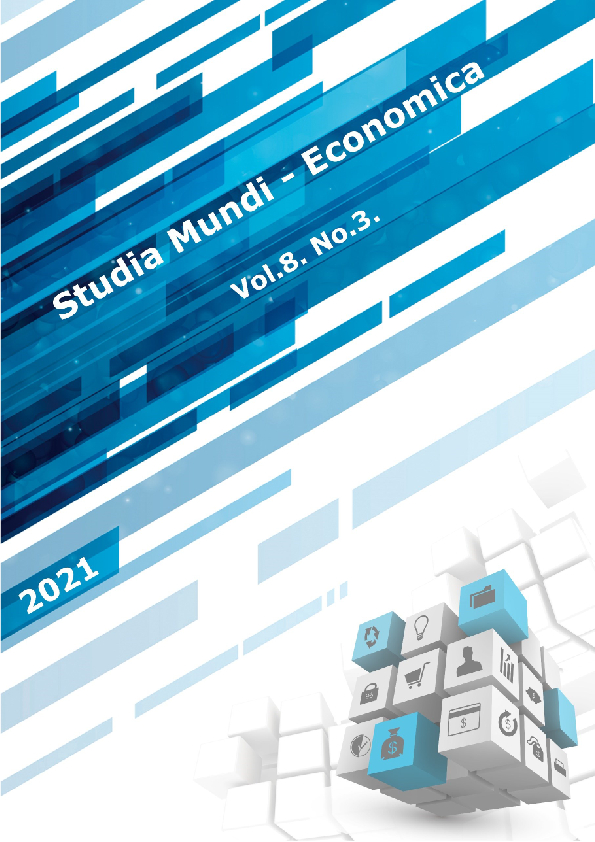The effect Syrian war on the trade and the role of sme development organization
DOI:
https://doi.org/10.18531/Studia.Mundi.2021.08.03.105-116Kulcsszavak:
SME, Support, International, TradeAbsztrakt
In this paper, the effect of the Syrian war on the export of SMEs in Hatay province, located on the Syrian border, is investigated and the role of KOSGEB (SME Development Organization of Turkey) is discussed. For the analysis companies were selected from Hatay. The examined population consists of 1176 exporting enterprises which does export and the sample size was 107 units. Furthermore, an attempt is made to identify the relevant factors causing problems for the SME’s, namely if their country of origin, area of activity, export-orientation and export-intensity was a distinctive factor. It was found that export volume and KOSGEB’s subsidies was a significant factor in explaining business disruption, but other factors turned out to be irrelevant. This lead to the conclusion that the role and activity of KOSGEB (e.g. detailed company analyses, foreign market analyses, regional research and KOSGEB support) should be expanded to more companies.
Hivatkozások
Akgündüz, Y. E., van den Berg, M., & Hassink, W. (2018). The Impact of the Syrian Refugee Crisis on Firm Entry and Performance in Turkey. The World Bank Economic Review, 32(1), 19–40. https://doi.org/10.1093/wber/lhx021
Akgündüz, Y., van den Berg, M., & Hassink, W. H. J. (2015). The Impact of Refugee Crises on Host Labor Markets: The Case of the Syrian Refugee Crisis in Turkey. https://papers.ssrn.com/abstract=2564974
Bahcekapili, C., & Cetin, B. (2015). The Impacts of Forced Migration on Regional Economies: The Case of Syrian Refugees in Turkey. International Business Research, 8(9), p1. https://doi.org/10.5539/ibr.v8n9p1
Cronbach, L. J. (1951). Coefficient alpha and the internal structure of tests. Psychometrika, 16(3), 297–334. https://doi.org/10.1007/BF02310555
Cronbach, L., & Shavelson, R. (2004). My Current Thoughts on Coefficient Alpha and Successor Procedures. Educational and Psychological Measurement - EDUC PSYCHOL MEAS, 64, 391–418. https://doi.org/10.1177/0013164404266386
Carpio, D., Ximena, V.; Wagner, M. C., 2015. The impact of Syrian refugees on the Turkish labor market : The impact of Syrians refugees on the Turkish labor market (English). Policy Research working paper; no. WPS 7402 Washington, D.C. : World Bank Group. Retrieved 8 January 2021, from http://documents.worldbank.org/curated/en/505471468194980180/The-impact-of-Syrians-refugees-on-the-Turkish-labor-market
Esen, O., & Oğuş Binatlı, A. (2017). The Impact of Syrian Refugees on the Turkish Economy: Regional Labour Market Effects. Social Sciences, 6(4), 129.https://doi.org/10.3390/socsci6040129
Fattah, S. A. (2011). The Changes in the Arab Policy of Turkey from 2002-2010: With a special reference to the Turkish Policy towards Syria (MSc Thesis). American University in Cairo.
Hinkelmann, K., & Kempthorne, O. (2007). Design and Analysis of Experiments, Volume 1: Introduction to Experimental Design, 2nd Edition | Wiley (2nd ed.).
Ianchovichina, E., & Ivanic, M. (2014). Economic Effects of the Syrian War and the Spread of the Islamic State on the Levant. The World Bank. Retrieved 14 January 2021, from https://www.worldbank.org/content/dam/Worldbank/document/MNA/extended-summary-impact-of-ISIS.pdf (Accessed: 14 January 2021)
Lindman, H. R. (1974). Analysis of variance in complex experimental designs (1st edition). W. H. Freeman.
Özpek, B. B., & Demirağ, Y. (2014). Turkish foreign policy after the ‘Arab Spring’: From agenda-setter state to agenda-entrepreneur state. Israel Affairs, 20(3), 328–346. https://doi.org/10.1080/13537121.2014.922806
Salloukh, B. F. (2017). The Syrian War: Spillover Effects on Lebanon. Middle East Policy, 24(1), 62–78. https://doi.org/10.1111/mepo.12252
Soper, H. E., Young, A. W., Cave, B. M., Lee, A., & Pearson, K. (1917). On the distribution of the correlation coefficient in small samples. Appendix ii to the papers of “student” and r. A. Fisher. A cooperative study. Biometrika, 11(4), 328–413. https://doi.org/10.1093/biomet/11.4.328
Student. (1908). The Probable Error of a Mean. Biometrika, 6(1), 1–25. https://doi.org/10.2307/2331554
Letöltések
Megjelent
Folyóirat szám
Rovat
License
Copyright (c) 2021 Selim Çörekçioğlu, Tahmina Musayeva, Deniz Horuz, Mark Molnar

This work is licensed under a Creative Commons Attribution-NonCommercial-NoDerivatives 4.0 International License.
A folyóirat Open Access (Gold). Cikkeire a Creative Commons 4.0 standard licenc alábbi típusa vonatkozik: CC-BY-NC-ND-4.0. Ennek értelmében a mű szabadon másolható, terjeszthető, bemutatható és előadható, azonban nem használható fel kereskedelmi célokra (NC), továbbá nem módosítható és nem készíthető belőle átdolgozás, származékos mű (ND). A licenc alapján a szerző vagy a jogosult által meghatározott módon fel kell tüntetni a szerző nevét és a szerzői mű címét (BY).






